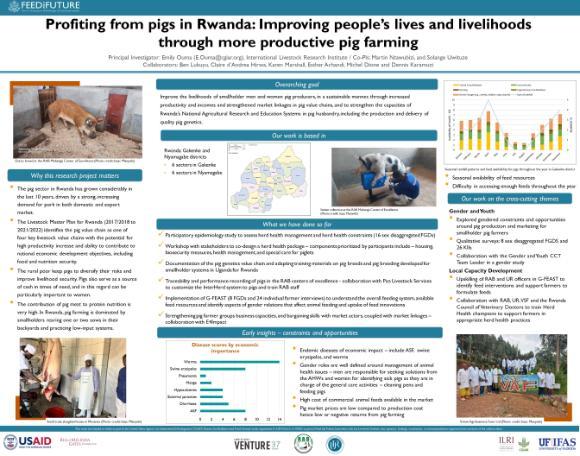Profiting from Pigs in Rwanda: Improving People’s Lives and Livelihoods Through More Productive Pig Farming
- Research Project Location: Rwanda
- Timeframe: May 2022 - 2025 (Terminated in February 2025)
- Funding: USAID
Introduction
The pig value chain in Rwanda has high potential but faces production and market-related constraints related to reproduction, nutrition, husbandry practices, marketing, and processing. Integrating interventions to improve herd health, feeding, genetics, and market linkages can overcome these constraints and lead to a more productive pig sector.
Project Goal & Objectives
The overarching goals of the project were to improve the livelihoods of smallholder pig producers, in a sustainable manner, through increased productivity and incomes. Specific objectives were to:
- Develop, pilot, and evaluate an integrated pig husbandry package comprising herd health, feeds and appropriate pig feeding and improved pig genetics
- Develop, pilot, and evaluate collective action business models for women and men pig farmers to improve access to inputs and services, and to markets.
- Support the national system to improve pig genetics
- Support the Centers of Excellence in development of an outreach program on pig keeping
Background
The pig sector in Rwanda has grown considerably in the last decade, driven by a strong, increasing demand for both domestic and export pork. The Livestock Master Plan for Rwanda (2017/2018 to 2021/2022) identifies the pig value chain as one of four key livestock value chains with the potential for high productivity increase and ability to contribute to national economic development objectives, including food and nutrition security.
The rural poor keep pigs to diversify their risks and improve livelihood security. Pigs also serve as a source of cash in times of need, and in this regard can be particularly important to women. The contribution of pig meat to protein nutrition is very high. In Rwanda, pig farming is dominated by smallholders rearing one or two sows in their backyards and practicing low-input systems. Despite its high potential, particularly for smallholders, the pig value chain faces critical production and market related constraints.
Research Approach
The project would address constraints by focusing on integrated productivity-enhancing and market linkage interventions that meet the needs and preferences of pig keepers. Through a random phased-in design, the project will be implemented via four interlinked objectives. Gender components are integrated into all objectives. Local capacity development, particularly of the National Agricultural Research and Education Systems and private sector, as well as knowledge exchange (including beyond Rwanda), are key components of the project. The strategic partnerships with the national partners and other private sector and “next users,” such as artificial insemination businesses, pig feed millers and feed processors, coupled with capacity development interventions are expected to facilitate investment from partners to take innovations to scale.
Principal Investigator (PI) and Lead Institution

Emily Ouma, International Livestock Research Institute, ILRI
Additional Collaborators
- University of Rwanda
- Rwanda Agriculture and Animal Resources Development Board, RAB
- Orora Wihaze Activity, Land O’Lakes Venture37
- Rwanda Pig Farmers Association
Resources
- Assesment of feed resources availability and use for livestock in Nyamagabe district, southern province, Rwanda.
- Assesment of feed resources availability and use for livestock in Gakenke district, northern province, Rwanda.






